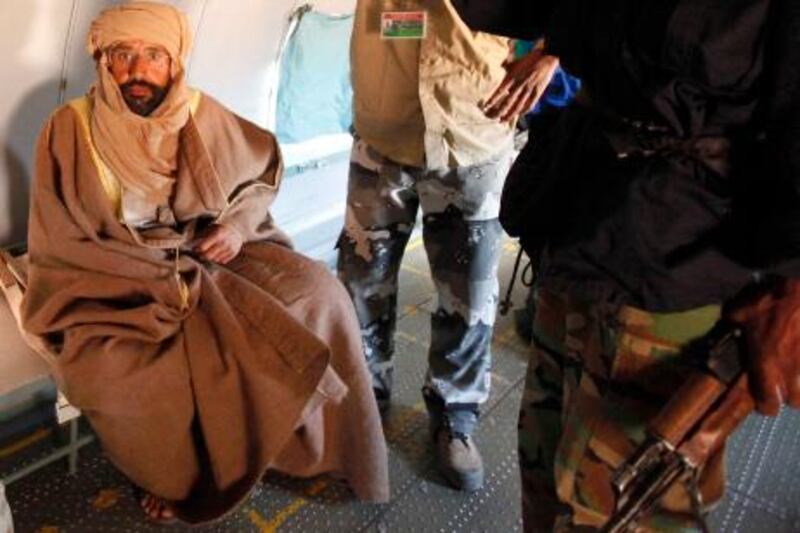The capture yesterday of Muammar Qaddafi's son, Saif Al Islam, has reduced the chances of a loyalist insurgency, while creating a potential custody battle among Libyan forces and the International Criminal Court.
Saif Al Islam was arrested near the southern town of Obari by fighters from the mountain town of Zintan, according to Libyan officials and militia leaders cited by Reuters news agency.
The head of the brigade which arrested Saif Al Islam said he asked his captors "to fire a bullet to my head and take me [dead] to Zintan".
Held yesterday in Zintan, Saif Al Islam's fate remains unclear. Libya's National Transitional Council (NTC) and the ICC both want him for trial, while Zintan militiamen planned to detain him until a new government is formed.
Prime minister designate Abdurrahim El Keib is scheduled to form that government by Tuesday.
Meanwhile, Libya is under pressure to ensure that the 39-year-old be treated humanely after the apparent battlefield executions last month of his father and his brother, Muatassim.
Luis Moreno Ocampo, the ICC's prosecutor, said yesterday that he would travel this week to Libya for talks with NTC authorities on where Saif Al Islam might be tried.
The ICC has accused Saif Al Islam, along with his late father and former security chief Abdullah Senoussi, of crimes against humanity.
Saif Al Islam has denied the charge and had sought in recent weeks to negotiate his surrender directly to the ICC.
However, Libya's interim leaders may decide whether to release him to ICC custody, Mr Ocampo said yesterday in remarks quoted by the Associated Press.
"The good news is that Saif Al Islam is arrested, he is alive, and now he will face justice," Mr Ocampo said. "Where and how, we will discuss it."
The European Union, which includes Nato members and early NTC allies France and Britain, urged Libya's interim government yesterday to work with the ICC to ensure Saif Al Islam a fair trial.
The call for a fair trial was echoed by Lt Gen Charles Bouchard, the Canadian military commander who led Nato's mission in Libya in support of the revolt that brought down Muammar Qaddafi's four-decade rule.
Saif Al Islam's arrest "is critical in that it helps this country bring closure," Gen Bouchard said, quoted by Agence France-Presse. He added that Libya's new rulers must show "their ability to exercise legitimacy through the proper conduct of law and order and a fair trial."
Human Rights Watch yesterday called on Saif Al Islam's captors to turn him over to the ICC and questioned their ability to guarantee humane treatment, citing alleged abuses in post-Qaddafi Libya and the killings of Muammar and Muatassim Qaddafi.
Muammar Qaddafi was captured last month by militiamen from the city of Misurata as he fled his hometown of Sirte. While video footage showed him injured but alive at the time of capture, he was killed later that day by a gunshot to the temple.
Muatassim Qaddafi was also killed about the same time, with video footage that showed him in captivity and in good health.
Saif Al Islam's capture leaves Mr Senoussi, the former security chief, as the only senior regime figure still at large.
NTC officials have indicated that Saif Al Islam might be tried in Libya with ICC observers.
"We Libyans do not oppose the presence of international monitors to monitor trial procedures that take place for the symbols of the former regime," interim justice minister Mohammed Alegui told Al Jazeera TV.
Another possibility is to try Saif Al Islam in Libya for alleged theft of public money before surrendering him to the ICC to answer charges of ordering lethal crackdowns on unarmed demonstrators, Reuters reported, citing NTC officials.
Before any trial can take place, Saif Al Islam must be transferred to NTC or ICC custody by the Zintan militiamen who held him as of yesterday evening.
The NTC has struggled to rein in the dozens of militias that arose after revolt broke out in February.
While Zintan militiamen have said that they will surrender Saif Al Islam to an interim government, militia leaders from the town have also publicly questioned the NTC's authority in recent months.
Among Libya's more powerful militias, Zintan forces took part in the assault on Tripoli that drove Muammar Qaddafi from power in August and later fought loyalists in the south-western desert.
It was in that desert yesterday that Zintan militiamen apprehended Saif Al Islam and two aides as they prepared to flee across the border to Niger, said militiamen quoted by Reuters.
"They couldn't get away because we had a good plan," said militiaman Wisam Dughaly. "He was not hurt and will be taken safely for trial so Libyans will be able to prosecute him and get back their money."
Long seen as a reformer who clashed at times with his father, Saif Al Islam transformed seemingly overnight into a regime stalwart in February.
In a televised address, Saif Al Islam, who once studied at the London School of Economics, warned Libyans of "rivers of blood" should they threaten his father's rule.
Saif Al Islam slipped out of Tripoli as the city fell to rebel militias and was later rumoured to be in Bani Walid.
By yesterday evening he was aboard an aircraft bound for Zintan, according to a Reuters reporter who travelled with him.
Heavily bearded and with his right hand injured in what he indicated was a Nato air strike last month, Saif Al Islam was asked by Reuters if he felt all right.
"Yes," he said.
* With additional reporting from Associated Press, Reuters and Agence France-Presse





